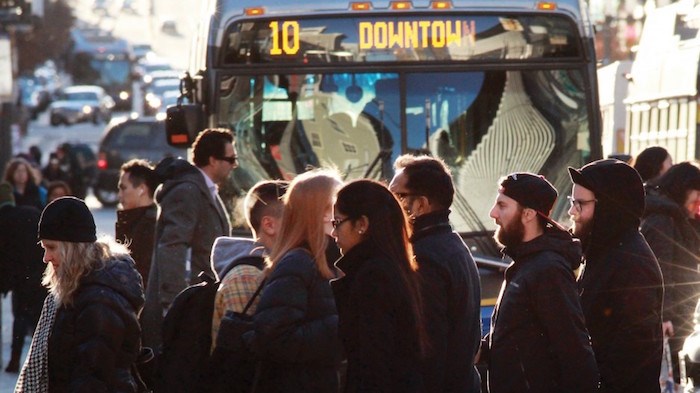 Bus drivers have warned that they plan to hold a system-wide strike if an agreement is not reached by Wednesday. Photo by Rob Kruyt
Bus drivers have warned that they plan to hold a system-wide strike if an agreement is not reached by Wednesday. Photo by Rob Kruyt
Premier John Horgan on November 21 repeatedly urged the bus drivers’ union Unifor to bargain with employer Coast Mountain Bus Co. (CMBC) and hammer out an agreement in advance of November 27, when Unifor has warned that it plans to launch a three-day system-wide strike.
Negotiations have stalled after the union walked out, saying that CMBC was not serious in wanting to make a deal.
CMBC appears to agree with the union that negotiations are not likely to be productive.
Its president, Mike McDaniel, on November 21, just minutes before Horgan held an 11:30 a.m. press conference, issued a news release saying that “for a fourth time” he was calling on the union to agree to mediation.
“CMBC is awaiting a response from the union,” McDaniel said.
Horgan was asked about whether the prospect of mediation, which his government could impose, but he reiterated that he believes that free collective bargaining is the way forward.
“I am confident that the best way to go forward is at the bargaining table. Until such time as the parties have an understanding of how close they can get, mediation may not be the right answer. I want the parties back at the table,” Horgan said.
“Timing is everything when there’s a labour dispute in play. I believe the time right now is for free collective bargaining to run its course. The weekend is available to the parties, into next week, and I’m confident that if they roll up their sleeves, they can get a freely bargained agreement that will meet the needs of the employer, the employees, and most importantly the people that depend on public transit.”
Horgan said that he knows that this is “cold comfort” to the people who are reflecting on how they are going to get around the city should there be a full-scale disruption but that this was his position.
He was asked about whether he would do anything to speed up the launch of ride hailing to provide more resources for people. He commended the “thinking outside the box” but did not commit to do anything to speed up ride hailing.
“When it comes again to issues around public transit in the lower mainland, the best place to be is around the bargaining table,” he said.
The legislature is in session next week and the B.C. government could act to impose a 90-day cooling-off period, where no further job action is taken. It could also impose arbitration or a vote by union members on the most recent CMBC proposal, or even impose an end to the job action with mandated settlement.
CMBC has offered wage hikes of 9.6% for approximately 3,800 bus drivers and 12.2% for about 1,000 maintenance workers over four years. Unifor wants a 15.2% increase for its bus drivers, and a 16.7% increase for its maintenance workers, compounded over four years.
The two sides had been negotiating for what Gavin McGarrigle, Unifor's western regional director, said was 29 days before his Unifor colleagues began job action on November 1.
The last time a system-wide transit strike started in Metro Vancouver was April 1, 2001. Gordon Campbell's Liberal government imposed a settlement on August 2 that had workers back on the job on August 7 of that year.
That four-month work stoppage started when the BC NDP were in government, and continued through that year’s provincial election and into the early days of the Campbell administration.
Slightly more than half of that dispute took place when then-BC NDP Leader Ujjal Dosanjh was premier, given that he left office on June 5, 2001.



